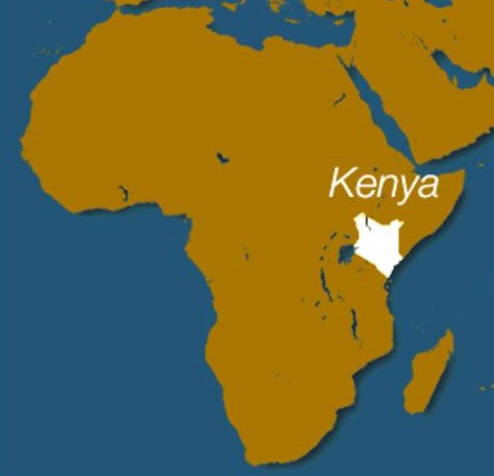By: Modupe Adeniyi. Freelance Health Reporter.

Map of Africa showing Kenya
Pneumonia accounts for 15% of all child deaths in Kenya, causing 8,000-10,000 deaths annually
- Ministry of Health, Kenya
March 1, 2024. Pneumonia continues to claim far too many young lives in Kenya. According to the Ministry of Health, approximately one in five child deaths is attributed to pneumonia, resulting in a staggering annual death toll ranging from 8,000 to 10,000.
The Ministry of Health has stated that pneumonia causes at least 15% of all child deaths in Kenya. This rate is higher than deaths from diarrhea, malaria, HIV and other major illnesses.
Pneumonia is claiming too many young lives and Kenya is unfortunately one of the top 15 countries in the world for pneumonia deaths in children.
Pneumonia is a form of acute respiratory infection that affects one or both lungs. It causes the air sacs of the lings to fill up with fluid or pus. It can be caused by viruses, bacteria and fungi.
Common pneumonia symptoms may vary from mild to severe and include cough with or without mucous, fever, chills, difficulty breathing, chest pain, fatigue, rapid heartbeat, vomiting and loss of appetite. These symptoms often resemble those of the cold or flu.
"Pneumonia affects all ages but children are the most vulnerable,” said Dr Roselyne Malangachi, a consultant paediatrician at the Kakamega Teaching and Referral Hospital.
She added: “Despite vaccination, our babies still die of pneumonia.”
According to the World Health Organization (WHO), approximately 14 percent of global deaths of children under five in 2019 were attributed to pneumonia - over 700,000 young lives lost each year.
Notwithstanding Dr. Malangachi's statement that immunised children still die of pneumonia, the World Health Organization still advises that immunising children at 6, 10 and 14 weeks with the pneumococcal, Hib and influenza vaccines is the most effective way to preventing pneumonia.
The practice of good hygiene practices within households, including proper hand washing techniques and use of clean cooking fuels can significantly reduce respiratory infections that lead to pneumonia.
Adequate nutrition is also crucial to improving children's natural defences against infections and this should start with exclusive breastfeeding of infants up to six months. Breast milk passes critical antibodies from mother to baby that protect against illness.
Parents should seek immediate medical care early when signs of respiratory distress appear before infections progress to severe and often fatal pneumonia.
With concerted efforts to raise awareness and increase protective measures, Kenya can dramatically reduce the loss of precious young lives to this preventable and treatable disease.
More vigilance and action is needed to combat this top child killer.
Published: February 28, 2024
© 2024. Datelinehealth Africa Inc. All rights reserved.
Permission is given to copy, use and share content for non-commercial purposes without alteration or modification and subject to attribution as to source.
DATELINEHEALTH AFRICA INC., is a digital publisher for informational and educational purposes and does not offer personal medical care and advice. If you have a medical problem needing routine or emergency attention, call your doctor or local emergency services immediately, or visit the nearest emergency room or the nearest hospital. You should consult your professional healthcare provider before starting any nutrition, diet, exercise, fitness, medical or wellness program mentioned or referenced in the DatelinehealthAfrica website. Click here for more disclaimer notice.